
Baduy people are an indigenous Sundanese ethnic group native to the southeastern part of Banten, specifically Lebak Regency, Banten, Indonesia.
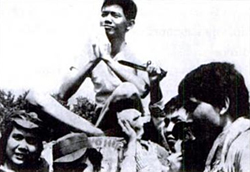
Soe Hok Gie was a Chinese Indonesian activist who opposed the successive dictatorships of Presidents Sukarno and Suharto.
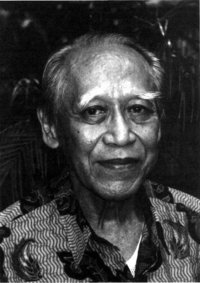
Kanjeng Pangeran Haryo Prof. Dr. Koentjaraningrat was an Indonesian anthropologist. He is sometimes referred to as "the father of Indonesian anthropology".

Karet Bivak is a cemetery in Jakarta, Indonesia. It is the second largest in the city.

? is a 2011 Indonesian drama film directed by Hanung Bramantyo. It stars Revalina Sayuthi Temat, Reza Rahadian, Agus Kuncoro, Endhita, Rio Dewanto, and Hengky Sulaeman. The film focuses around Indonesia's religious pluralism, which often results in conflict between different beliefs, represented in a plot that revolves around the interactions of three families, one Buddhist, one Muslim, and one Catholic. After undergoing numerous hardships and the deaths of several family members in religious violence, they are reconciled.

Ratna Asmara, also known as Ratna Suska, was an Indonesian actress and director. Originally active in theatre, she starred in the romance film Kartinah (1940), which her first husband Andjar directed.

Raden Inoe Perbatasari was an Indonesian politician turned film director and actor.
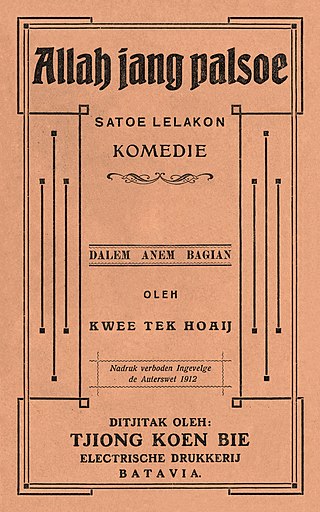
Allah jang Palsoe is a 1919 stage drama from the Dutch East Indies that was written by the ethnic Chinese author Kwee Tek Hoay based on E. Phillips Oppenheim's short story "The False Gods". Over six acts, the Malay-language play follows two brothers, one a devout son who holds firmly to his morals and personal honour, while the other worships money and prioritises personal gain. Over more than a decade, the two learn that money is not the path to happiness.
The 2nd Annual Maya Awards was an award ceremony honoring the best in Indonesian films of 2013. The ceremony was held in Hotel Umaniara De'Brawijaya, Kebayoran Baru, South Jakarta, on December 21, 2013.

Produksi Film Negara is an Indonesian state-owned film funding company, previously a film production company. PFN is one of the pioneers in Indonesian film industry at the time when it is formed.

Boes Boestami was an Indonesian journalist and film actor. He was mostly known for his comedic roles.
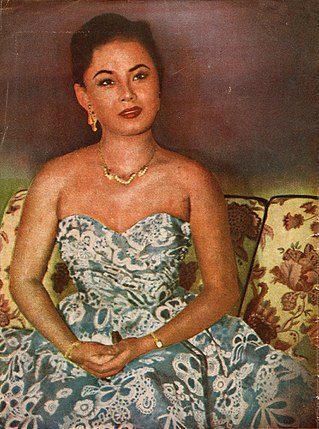
Netty Herawaty was an Indonesian actress who made more than fifty films between 1949 and 1986.

Sedap Malam is a 1951 film directed by Ratna Asmara and produced by Djamaluddin Malik for Persari. Starring Sukarsih and M. Pandji Anom, it follows a woman who descends into prostitution after her husband marries another woman. It was both Persari's first production and the first film directed by a woman in Indonesian history.

Samiun dan Dasima is a 1971 Indonesian film directed by Hasmanan. Starring Chitra Dewi and W.D. Mochtar, it follows a njai (concubine) named Dasima who is wooed, misled, and ultimately killed by a man who seeks her wealth.
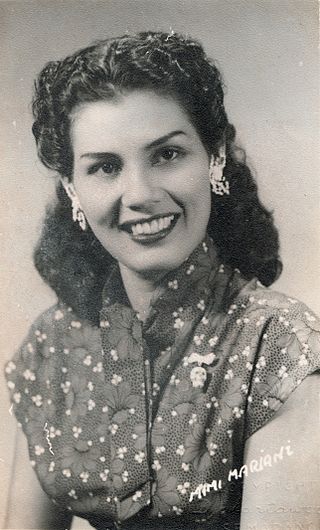
Sumiarto Suharto, better known by the stage name Mimi Mariani, was an Indonesian actress, model, and singer. Known as the first Sri Asih, she was one of the Indonesian's leading lady in the 1950s and was ranked third on the list of the best Indonesian pasindhèn. Mariani was the part of Classical Indonesian Cinema.

Sri Asih is a 1954 Indonesian lost superhero film directed by Tan Sing Hwat and Turino Djunaedy, and starring Mimi Mariani, Djunaedy, Ali Joego, and Nazar Dollar. This film was the first Indonesian superhero film adapted from comics by R. A. Kosasih.

Kenangan Masa is a 1951 Indonesian lost drama film directed by Dr. Huyung and starring Nana Mayo, S. Bono, and Titien Sumarni. This film marks the screen debuts of Roostijati.

Lenggang Djakarta is a 1953 Indonesian drama film directed by M. Arief and starred Bambang Hermanto, Mimi Mariani, and Ismah BS.
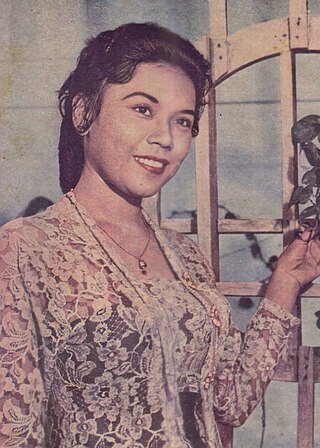
Lely Sulastri is an Indonesian actress and dancer who was active in the 1950s and 1960s. She is the sister of actress Lies Permana Lestari and is the part of Classical Indonesian Cinema.

Lies Permana Lestari Pudjiastuti was an Indonesian actress who was active in the 1950s. She was known for her role as Sulastri in Belenggu Masjarakat (1953) and in Kasih Sajang (1954) along with her husband, S. Bono.




















